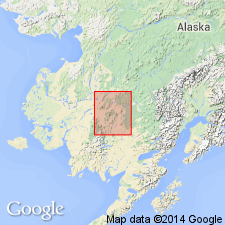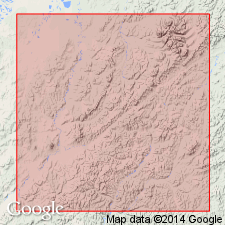
- Usage in publication:
-
- Iditarod basalt*
- Modifications:
-
- Named
- Dominant lithology:
-
- Basalt
- AAPG geologic province:
-
- Alaska Southwestern region
- Alaska West-Central region
Summary:
Named for Iditarod River, central Kuskokwim region, southwestern AK. Forms range of hills southeast of Iditarod River which extends northeastward from Russian Mountains for nearly 50 mi. Best and typically exposed in wide tract northeast of Montana Creek in vicinity of DeCourcy Mountain. Also well exposed on eastern slopes of Russian Mountains. Comprises chiefly massive basalt lava flows underlain by thin basal zone of sedimentary breccia. Fresh specimens of basalt are commonly greenish black though some are blue black and purplish black. Rock weathers brown. Breccia is commonly mottled with dark and light shades and weathers brown. Is between 2000 and 3000 ft thick. Disconformably overlies and may intertongue with Kuskokwim group. Intruded by quartz-monzonite stock of Russian Mountains. Iditarod is believed to be middle or late Late Cretaceous age.
Source: GNU records (USGS DDS-6; Menlo GNULEX).

- Usage in publication:
-
- Iditarod Volcanics*
- Modifications:
-
- Redescribed
- Age modified
- Geochronologic dating
- AAPG geologic province:
-
- Alaska Southwestern region
- Alaska West-Central region
Summary:
Iditarod Basalt redescribed as Iditarod Volcanics to reflect its diverse lithologic composition. Age is Late Cretaceous and early Tertiary based on K-Ar ages of 76.7 +/-2.3 Ma (on basal andesite), 66.1 +/-2.0 Ma (on olivine basalt from upper mafic to intermediate volcanic rock), and 62.7 +/-1.9 Ma (on plagioclase from olivine basalt of the upper part). Specimens were collected from unit at DeCourcy Mountain.
Source: GNU records (USGS DDS-6; Menlo GNULEX).
For more information, please contact Nancy Stamm, Geologic Names Committee Secretary.
Asterisk (*) indicates published by U.S. Geological Survey authors.
"No current usage" (†) implies that a name has been abandoned or has fallen into disuse. Former usage and, if known, replacement name given in parentheses ( ).
Slash (/) indicates name conflicts with nomenclatural guidelines (CSN, 1933; ACSN, 1961, 1970; NACSN, 1983, 2005, 2021). May be explained within brackets ([ ]).

